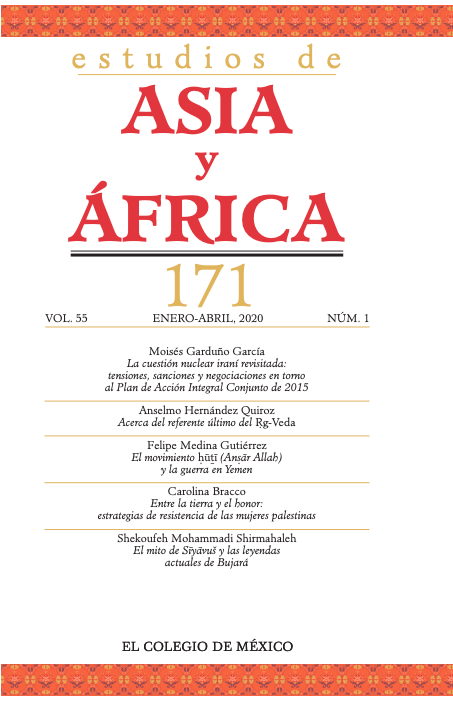Resumen
Las traducciones más recientes del Ṛg Veda consideran este texto como un ejemplar de poesía litúrgica o literatura religiosa. Sin embargo, no se discuten claramente los parámetros con los cuales se le cataloga así. Es relevante volver a preguntar: ¿el Ṛg Veda es un texto religioso?, ¿está asociado a algún tipo de religión? Investigo la cuestión del referente último tal como se plantea en el Ṛg Veda. Argumento que hay pasajes tanto de determinación como de indeterminación textual esparcidos homogéneamente, por lo que, al no poder hablar rigurosamente de determinación o indeterminación total, el referente último que se denota no está definido. Por ello considero que el pensamiento védico más antiguo —atestado en el Ṛg Veda— difiere tanto del pensamiento religioso como del filosófico, pues éstos quedan definidos por los conceptos de “dios” y “principio”. En cambio, propongo entender el pensamiento védico más antiguo como un ejemplar de poesía iniciática.
Referencias
Balagangadhara, S. N. (1994). The heathen in his blindness: Asia, the West, and the dynamic of religion. Leiden: Brill. https://doi. org/10.1163/157006898X00088
Geldner, K. F. (1951). Der Rig-Veda. Aus dem Sanskrit ins deutsche Übersetzt un mit einem laufenden Kommenar versehen (Vol. 1). Cambridge, MA: Harvard University Press.
Ghose, A. (1971). The secret of the Veda. Pondicherry: Sri Aurobindo Ashram.
Jamison, S. W. y Brereton, J. P. (Trads.) (2014). The Rig Veda: The earliest religious poetry of India (Vol. 1). Nueva York, NY: Oxford University Press.
Johnson, W. (1980). Poetry and speculation of the Ṛg Veda. Berkeley, CA: University of California Press.
Keith, A. B. (1925). The Religion and philosophy of the Veda and Upanishads (2 vols.). Cambridge, MA: Harvard University.
Kunhan Raja, C. (Trad.) (1956). Asya Vāmasya Hymn. (The Riddle of the Universe): Rigveda 1.164. Madras: Ganesh & Co.
Macdonell, A. A. (1917). Excerpts from: A Vedic reader. For students. Recuperado de http://www.sacred-texts.com/hin/vedaread.htm
Masuzawa, T. (2005). The invention of world religions or, how European universalism was preserved in the language of pluralism. Chicago, IL: University of Chicago Press.
Moreland, W. H. y Chatterjee, A. Ch. (1958). A short history of India. Londres: Longmans.
Müller, F. M. (2000). India: What can it teach us? Nueva Delhi: Penguin Books.
Oberlies, T. (1998). Die Religion des Ṛgveda: Erster Teil: Das religiöse System des Rμgveda. Wien: Institut für Indologie der Universität Wien.
Pincott, F. (1887). The first mandala of the Ṛig Veda. Journal of the Royal Asiatic Society, 19(4), 598-624. https://dx.doi.org/10.1017/ S0035869X00019717
Renou, L. (Trad.) (1956). Hymnes spéculatifs du Véda. París: Gallimard.
Spess, D. L. (2000). Soma: The divine hallucinogen. Rochester, VT: Park Street Press.
Thomson, K. (2009). A still undeciphered text: How the scientific approach to the Rigveda would open up Indo-European studies. Journal of Indo-European Studies, 37(1-2), 1-72.
Van Nooten, B. A. y Holland, G. B. (Eds.) (1994). Rig Veda: A metrically restored text, with an introduction and notes. Cambridge, MA: Harvard University Press.
Witzel, M. (2004), The Rμgvedic religious system and its Central Asian and Hindukush Antecedents. En A. Griffiths y J. E. M. Houben (Eds.), The Vedas: Texts, language and ritual. Proceedings of the Third International Vedic Workshop, Leiden 2002 (pp. 581- 636). Groninga: Egbert Forsten.
Witzel, M. et al. (Trads.) (2007). Rig-Veda: das heilige Wissen. Erster und zweiter Liederkreis. Frankfort del Meno: Weltreligionen.
Esta obra está bajo una licencia internacional Creative Commons Atribución-NoComercial-SinDerivadas 4.0.
Derechos de autor 2022 Estudios de Asia y África



